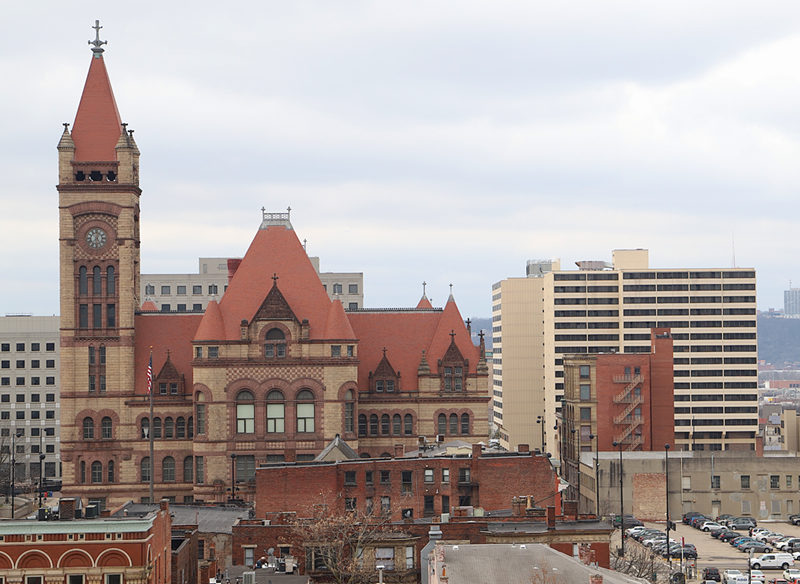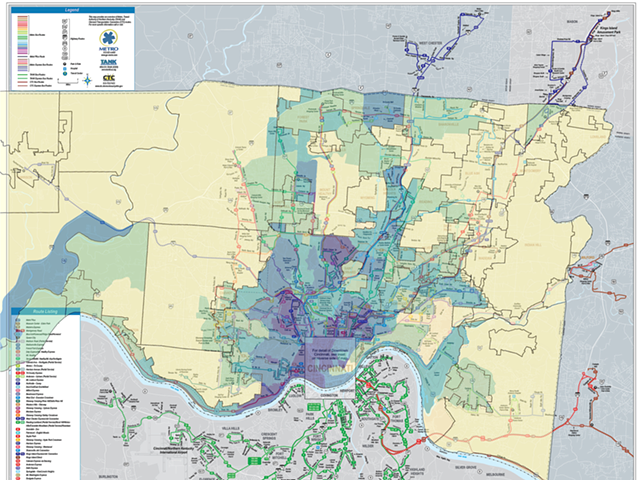Cincinnati City Council's Budget and Finance Committee tomorrow will hear public input on an ordinance from Councilman David Mann that would put restrictions on property owners looking to rent entire buildings on sites like Airbnb.
They could get an earful from both sides of an ongoing debate about the short-term rental sites.
The proposed restrictions wouldn't affect people renting out rooms in their homes, and the regulations have been adjusted from Mann's original proposal this spring. Still, some people say they go to far — and others say they don't go far enough.
Airbnb, and other sites like it, allow property owners to rent rooms or whole buildings for short-term stays, similar to a hotel. The companies don't own any real estate but simply broker the transaction between the owner and guest via an app or website in exchange for a small fee.
That can sometimes incentivize property owners, or investors who buy up rental properties, to convert traditional houses or apartment buildings into full-time Airbnb sites, which critics say can in turn can displace residents and eat into a city's housing stock. Cities like Seattle, San Francisco, Philadelphia and New York have passed or attempted to pass restrictions on short-term rentals so they don't exacerbate housing shortages there.
Mann's proposed regulations, aimed at balancing the popularity of Airbnb and others with affordable housing availability in neighborhoods like Walnut Hills and Over-the-Rhine, would only apply to rentals less than 30 days and to operators who don't live in the buildings they're renting out. Under the ordinance, those operating short-term rentals would be required to obtain a license to operate them. They would also have to pay a 7 percent tax on the money they make from the units, which would go toward funding affordable housing. Owners would be limited to three units they don't occupy, although current operators of Airbnbs would be grandfathered in and wouldn't have to abide by that cap for units they already operate. The rules would apply to individuals or LLCs who own separate rental properties. Those renting rooms in their own homes would be exempt from the cap and licensing requirements, but would still have to register their units.
"My goal in crafting this ordinance is to strike a balance between preserving and funding affordable housing units and community in neighborhoods, encouraging tourism and entrepreneurship through short-term rentals, and ensuring that all visitors to Cincinnati are staying in units that are safe and up to code," Mann said about the proposal.
The ordinance adjusts an earlier proposal Mann released in March which sought to cap the number of days in a year an operator of a stand-alone Airbnb could rent out rooms. Mann changed parts of that proposal after considering feedback.
When putting forward the initial legislation, Mann acknowledged the "very real positive economic and tourism benefits" of sites like Airbnb and notes that owner-occupied housing isn’t included in the law, so if you’re just renting out the extra bedroom in your house you won’t need to change anything.
Cincinnati currently needs about 30,000 more units of housing that is affordable to its lowest-income residents, according to estimates from the Ohio Housing Finance Agency. Average rent in Cincinnati is roughly $900 a month, meaning landlords only need to rent out their properties on Airbnb at the city’s average rate of $114 a day for nine days to make the same return.
While data on the effect of Airbnb rentals on housing costs is scant, Mann's ordinance cites incidents in which Cincinnati landlords have evicted tenants to convert buildings into full-time Airbnb rentals.
Some community members and nonprofit leaders such as Over the Rhine Community Housing Director Mary Burke Rivers, Greater Cincinnati Homeless Coalition Director Josh Spring, and Over-the-Rhine resident Margy Waller sent a letter to Cincinnati City Council in August asking elected officials to enact restrictions on the practice of renting buildings on Airbnb. In addition to Mann's proposed regulations, the group wants neighborhood residents to be able to petition the city to create short-term rental prohibition zones. They also want some of the money gleaned from taxing Airbnbs to go to affordable housing, for the city to require Airbnb and other sites to be responsible for the collection of taxes associated with the rentals and for the city to make sure the sites don't list rentals without the proper license and registration and other measures.
"We have seen neighbors evicted from 'naturally occurring affordable housing' (rental homes that are affordable without public subsidy) in rapidly changing neighborhoods, housing that has been replaced with non-owner-occupied full-time Airbnb rentals," the letter reads. "We have seen newly-renovated housing marketed and sold to investors as non-owner-occupied full-time Airbnb rentals — and kept off the market to renters. We have seen developers attempt to turn entire buildings into illegal Airbnb hotels in Over-the-Rhine."
The group goes on to say that such activity leads to the loss of full-time neighborhood residents who are invested in the communities they live in.
But some Airbnb operators take issue with the group's assessment, saying that their units don't harm the neighborhood but instead bring it economic benefit. Some proponents of the short-term rental sites point to data showing guests tend to stay in neighborhoods longer and spend more at local businesses than hotel guests. They also point out that some buildings currently hosting Airbnb guests would otherwise be vacant, and that the temporary income property owners get from Airbnb could make rehab jobs viable when they otherwise wouldn't be.
Cincinnati has about 830 active Airbnb rentals, according to AIRDNA, an independent site that tracks the rentals in many cities. That's up from about 640 the site showed in March. Cincinnati's Airbnb stock has an average rent of roughly $114 a day, according to AIRDNA. About 67 percent of those are rentals encompassing an entire house, condo or apartment — up from 60 percent this spring. The city has seen a 41 percent annual growth rate in those rentals in recent years.
In the 45202 area code, which covers downtown, Over-the-Rhine and Mount Adams, there are more than 190 active rentals averaging a rate of $144 a day — up from 140 this spring averaging $124 a day. Eighty-one percent of those rentals are an entire building.
There are another 47 Airbnb sites in area code 45206, which encompasses rapidly redeveloping Walnut Hills. That's up from 30 back in March. Seventy-four percent of those are entire-building rentals that would be subject to Mann’s ordinance, up from just under 60 percent this spring. Those units average about $162 a day. That data doesn't include rentals on other, similar sites.
Under the ordinance, operating a non-owner occupied Airbnb property without a license, or violating the terms of that license, would constitute a fineable civil offense.






